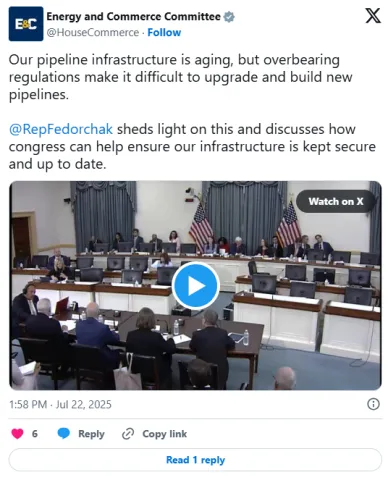Fedorchak advocates for PHMSA reforms at Energy Subcommittee hearing
Washington, D.C. – At an Energy Subcommittee hearing on pipeline safety policy, Congresswoman Julie Fedorchak (R-ND) called for faster training programs for state pipeline inspectors and the revival of key pipeline safety demonstration programs at the Pipeline and Hazardous Materials Safety Administration (PHMSA). Her questioning highlighted delays and bureaucratic hurdles at the federal level that are putting public safety and energy reliability at risk.

ON SPEEDING UP TRAINING FOR STATE PIPELINE INSPECTORS:
Congresswoman Julie Fedorchak: “I have recognized the challenges of PHMSA in terms of staffing for years. One of the challenges is they don't operate a state inspection training program as effectively as they could to help get more state inspectors out there. It takes too long to certify these people. So, what do you think they could be doing to help, and what are you guys focusing on, in terms of encouraging PHMSA to use remote training programs and get the training system up to speed so state inspectors can hit the ground running sooner?”
Mr. Black: “State inspectors with quality experience and knowledge on pipeline inspections is very important. I've been to PHMSA’s Training Center in Oklahoma City. You're right, it's important to be able to expand the capacity of that training. It's in the industry's interest. Anybody inspecting a pipeline is quality, knows what they're doing, and is working in concert with others—we'd like to do that. We'd like to also see states reduce damage prevention exemptions so that we can protect pipeline safety, and then to work in their inspections with PHMSA to make sure they're not duplicative when PHMSA has approved a state to inspect interstate transmission.”
Mr. Caram: “You've identified a real issue with state programs. I think in addition to how long training takes, increasing PHMSA’s ability to attract and retain talent—I know there's a lot of competition for these inspectors once they're trained to be paid more by the industry. So, giving the state programs more flexibility under the PHMSA program, in their ability to attract and retain through the funding and their agreements, I think would go a long way in keeping that talent on the state programs longer."
ON REVIVING THE PIPELINE SAFETY TECHNOLOGY DEMONSTRATION PILOT PROGRAM:
Congresswoman Julie Fedorchak: “I'm curious about this demonstration program that was choked off by the last administration. Everybody here has talked about the use of technology and that's something that we should be able to agree on in a bipartisan manner—let's use the technology for a better purpose. What do we need to do to reinvigorate this pilot program so we can test some of this stuff and get it in the field?”
Mr. Black: “First, Congresswoman, reauthorize the program in this upcoming reauthorization. It lapsed. Nobody used it just because PHMSA applied rules that you all didn't tell them to do. So, tell them to do it without bureaucratic hurdles. I don't think they will apply the special permit process or NEPA to these decisions but show PHMSA the importance you have in demonstrating new technologies and how they can improve pipeline safety.”
###